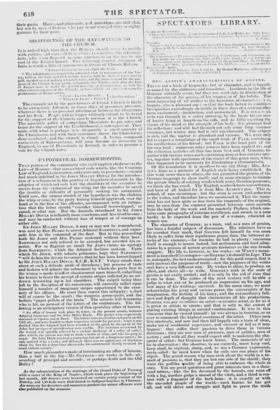of August next, Iv• umler the prinful necessity . of discontinuing,
us well the Tuts is not a book of biography, but of character, and is happily other current exptmsrs of the Church, as thus:: tre atten,Lut upon the so named by the authoress and translator. Incidents in the life of GOETHE natxtrally occur, but they are use(1 only in illustration of Chureliv-trdens " the character of his genius, of his temper, or of his habits. The
most improving of all studie's is the lermation of character : it is, happily, also a 'pleasant one ; so that the book bne us combines
to be extensively followed, in these days of pecuniary pressure, a two qualities exceedingly desirable in these days of a seeking after•wherever there is no personal attachment between the clergyman
mere excitement,—instruction, and amusement. It is not a work to be run through in a sultry morning, by the hasty turner over of leaves lying at length on the sofa, and as little exerting the Vigour of his mind as the strength of his body : it is pleasant food for reflection; and will last through not only some long summer evenings, but winter may find it still unexhausted. The subject is rich, and the matter is abundant and various. We were only exclusively of Episcopalians, will soon become as necessary in led to expect a translation of the small work of FALK, containing England, as one of Protestants in Ireland, in order to procure a his recollections of his friend; but FALK is the least part of his vote for the Church-rates. his own book : numerous other sources have been applied to; and
the collection includes all that has been best said of GOETHE, to-
ether with various notes,each containing more or less curious mat-
POTHETICAL HORSEWHIPPING. ter, together with specimens of tile works of this great man, when THAT portion of the community who yield implicit obedience to the they happened to be necessary for illustrating a characteristic. Laws of Honour—that non-existent code which, like the Common Of the translation it is needless to say any thing; Mrs. Aus- Law of England, is unwritten, and exists only in precedents—should TIN'S fame as a mistress of English style being established. In feel much indebted to Sir JOHN M 1 1. LEY Dovts for the introduc- this work more than in others, she has permitted the genius pf the lion of a refinement in the practice of hypothetical assault, by the German language to show itself; and in some attempts to imitate adoption of which not only will the shoulders of the assaultee be the private liberty of coining words which every German possesses, secure from the visitation of the whip, but the assaulter be saved we think she has erred. The English readerdetests uncouthness, the trouble or difficulty of personally seeking his antagonist. and least of all looked for it from Mrs. AusTisis pen. This is, Until now, the utmost stretch of the hypothesis was the shaking indeed, of rare occurrence: but the error is sweet and seductive the whip or cane, by the party feeling himself aggrieved, over the to the writer, and therefore have we mentioned it. That the trans- head or in the flice or the offender, accompanied with an intima- later has not been quite so free from the trammels of the original, tion that the latter should " consider himself horsewhipped," or may be seen from the contrast presented between some morsels caned, or what not. But the formula introduced by Sir Jon N from the body of the work and the masterly Preface, which con- MIL LEY DOYLE is infinitely more courteous, and less troublesome ; tains some paragraphs of extreme excellence, and struck in a tone and way be conducted without loss of temper or of courage on hardly to be expected from the pen of a woman, educated as
once. You see great questions and great interests torn in a thou- with a leg, another gulps a morsel of the vitals, and a third is cons
















 Previous page
Previous page